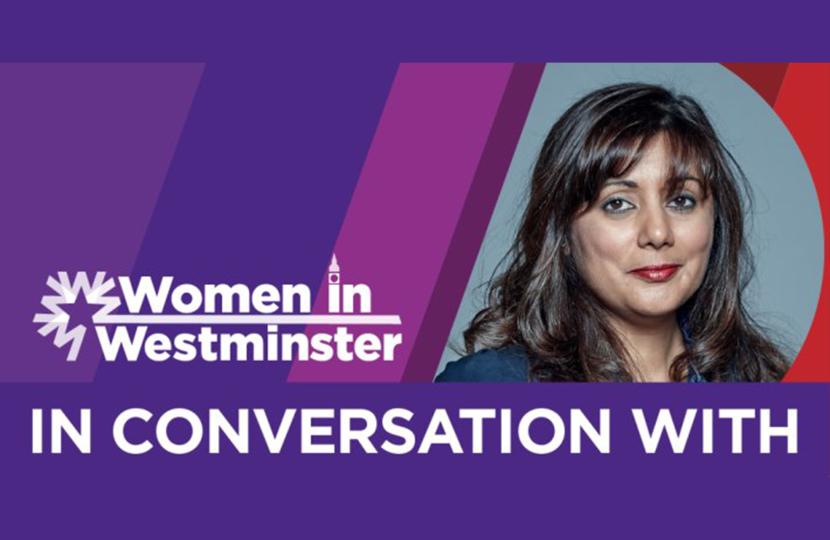
From calling out racism and misogyny in her own party to being sanctioned by both Russia and China, Nusrat Ghani MP has never been afraid to speak truth to power. As part of our Women in Westminster series, we sat down with Ghani to learn more about how the lack of a safety net can be a barrier for working-class women wishing to enter public life
“I didn’t enter politics not to have courage,” Nusrat Ghani MP tells Women in Westminster at one point during our sit-down conversation. “I didn’t enter politics to play games. I came in to try and deliver positive outcomes for people and my country.”
The more we speak, the clearer it becomes that “courage” is a characteristic that Ghani possesses in abundance. It is a quality that has helped propel the Sussex Weald MP to a number of significant firsts.
In 2024, she was elected as the Chairman of the Ways and Means, the principal Deputy Speaker in the House of Commons, becoming the first ethnic minority MP to sit in the Speaker’s chair. It was a milestone moment. Just as it had been in 2018, when she became the first Muslim woman to speak from the Despatch Box.
However, the roots of Ghani’s resilience, determination, and willingness to challenge expectations were evident long before she first entered the Commons in 2015.
“I never thought I’d end up in this job or be here,” she says with characteristic candour. “It was difficult. I was expected to leave school as a teenager and get married to a first cousin.”
In a world where many politicians often look and sound the same, Ghani’s path into politics was far from typical. Growing up in a working-class migrant family in social housing, politics felt distant and remote during her childhood. And the expectations placed on Ghani by those around her were a world away from her current role, managing debates in the House of Commons or speaking out about the plight of the Uyghur community in Xinjiang.
However, it feels that the core political values that Ghani now holds were partly forged from meeting the challenges she faced during her youth head-on. In particular, her continuing ability to hold onto a clear set of values and challenge the status quo feels like both a personal and political attribute.
The other core value that appears as a golden thread connecting Ghani’s upbringing and political career is a passionate belief in personal independence as the basis for living a happy and fulfilling life, particularly for women.
“I think I somehow learned early on that women without economic independence had very limited lives,” she explains. “I just didn’t want to be in a situation where I couldn’t be free to make the choices I wanted around my life. So, I knew I had to get an education and find work. That was the only way I could change my circumstances.”
Ghani attaches an enormous amount of importance to financial independence. She knows from her own life that, for girls and women in working-class communities, the lack of a wider safety net means that self-reliance is often the only way to being able to make key life choices.
“My mother had no economic independence. The women who came in and out of my home didn’t have economic independence, and their lives were governed by the choices men made for them,” she tells us. “I just didn’t want that for myself.”
Ghani believes that the challenges she herself faced are widespread and views them more as a consequence of class than ethnicity. She tells us that a key barrier to working-class girls entering public life is the lack of a wider network that provides ongoing support and encourages them to take risks.
“I think women and men are held to different standards, and if you’re a working-class woman who hasn’t had that mainstream political life – gone to Oxbridge, been mentored by senior officials in the party – you are held to a different standard,” she tells us. “You don’t have deep and long connections with those who hold power. So, you are always seen as slightly risky.”
That sense of not always being entirely accepted is something that Ghani herself experienced in 2020 when she was dismissed as a transport minister after the government chief whip told her that her “Muslimness” made some of her colleagues uncomfortable.
“It felt like being punched in the stomach,” she tells us as she recollects that event. “To be told that something I can’t fundamentally change about myself was a problem. I know the more ‘political’ thing would have been to accept it, but I wasn’t going to do that.”
The courage to challenge is something that Ghani circles back to throughout our discussion. However, she also understands how, for working-class girls and women, deviating from an expected path can make the consequences of failure much more acute.
“At 18, I had very little agency over my life. It wasn’t safe, and everything was a risk,” she remembers. “I was meant to be married off as a teenager. University wasn’t expected. There was no expectation I’d finish school. Every step I took away from that was risky – there was no going back. I couldn’t fail.”
Taking risks, showing courage, and not being afraid to challenge those around her has been a hallmark throughout Ghani’s life and political career. It also continues to motivate her to continue speaking out to make it easier for other working-class women to follow her own path into public life.
“I just don’t want anyone else to be in that position,” she explains. “Young women should have the opportunity to be whatever they want. It is risky. But every risk was worth it. I survived, and I’m here.”
The original article is available here.
